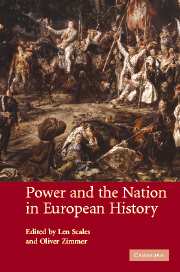Book contents
- Frontmatter
- Contents
- List of contributors
- Introduction
- PART I APPROACHES AND DEBATES
- 1 Were there nations in Antiquity?
- 2 The idea of the nation as a political community
- 3 Changes in the political uses of the nation: continuity or discontinuity?
- PART II THE MIDDLE AGES
- PART III ROUTES TO MODERNITY
- PART IV MODERNITY
- Index
3 - Changes in the political uses of the nation: continuity or discontinuity?
Published online by Cambridge University Press: 02 December 2009
- Frontmatter
- Contents
- List of contributors
- Introduction
- PART I APPROACHES AND DEBATES
- 1 Were there nations in Antiquity?
- 2 The idea of the nation as a political community
- 3 Changes in the political uses of the nation: continuity or discontinuity?
- PART II THE MIDDLE AGES
- PART III ROUTES TO MODERNITY
- PART IV MODERNITY
- Index
Summary
INTRODUCTORY REMARKS
In this essay I consider the claims that nations existed in pre-modern history and that political arguments appealing to such communities were significant. I argue that the limited evidence available from the pre-modern period suggests two principal ways in which the term ‘nation’ was used: ethnographically, to describe ‘barbaric’ societies, and as political self-description, usually of a territorial kingdom. The nation was subordinated to values associated with civilisation and monarchy. Strong claims for the nation as a ‘whole society’ with a widespread and continuous sense of national identity elide this ethnographic/political distinction and ignore the subordinate value nation plays in both kinds of discourse. Furthermore, those arguing for a significant pre-modern sense of nationality conflate fragmented pieces of evidence in which ‘nation’ and cognate terms are used, investing these with a coherence, continuity and political importance they did not possess.
I argue that national identity, understood as the processes of maintaining, reinterpreting and transmitting the values associated with the nation, has weak force in the pre-modern period because it operates discontinuously and does not fuse cultural identity with political interest, and its impact – often highly opportunistic and contingent – is confined to court, noble and Church elites. Finally, in this critical part of the essay, I suggest that nation and national identity (though not nationalism) become significant in specific parts of Europe during the confessional disputes of the early modern period but that this can be accommodated within a modernist framework.
- Type
- Chapter
- Information
- Power and the Nation in European History , pp. 67 - 102Publisher: Cambridge University PressPrint publication year: 2005
- 11
- Cited by



